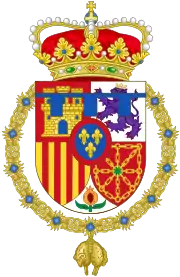Coat of arms of the Prince of Asturias
The blazon of the coat of arms of the Princess of Asturias is given by a Royal Decree 979 on 30 October 2015 which was an amendment of the Royal Decree 1511 dated Madrid 21 January 1977, which also created her guidon (military personal ensign) and her standard.[1]
| Coat of arms of the Prince of Asturias | |
|---|---|
 | |
| Armiger | Leonor, Princess of Asturias |
| Adopted | 30 October 2015 |
| Crest | Crown of the Princess of Asturias |
| Blazon | Quarterly: Castile, León, Aragon, and Navarre; enté en point, Granada; inescutcheonBourbon (Anjou Branch); the whole differenced by a label azure. |
| Order(s) | Order of the Golden Fleece |
| Earlier version(s) | See below |
Official blazon
The shield is divided into four quarters, blazoned as follows:
- 1st, Gules a castle three-towered Or, masoned Sable ajoure, (door and windows) Azure, for Castile;
- 2nd, Argent a lion rampant Purpure crowned Or, armed Gules and crowned Or, for León;
- 3rd, Or four pallets Gules, for Aragon;
- 4th, Gules a cross, saltire and orle of chains all linked Or, an emerald Proper, for Navarre;
- Enté en point, Argent a pomegranate Proper seeded Gules, supported, sculpted and leafed in two leaves Vert, for Granada;
- Inescutcheon, Azure with three fleurs-de-lys Or, bordured Gules, for Bourbon.
The whole is differenced by a label of three points Azure, the difference used by heirs apparent to the Spanish House of Habsburg.
The shield is surmounted by a closed crown, which is a circle of gold, inset with precious stones of their colours, composed of eight rosettes of acanthus leaves, of which five are visible, interspersed by pearls in their colour, issuing from which are four pearl diadems, of which three are visible, which converge in a blue orb, with gold semi-meridian and equator, surmounted by a gold cross, the crown lined with red and surrounded by the collar of the Golden Fleece.
History
| |||||||||||||||||||||||||||||||||||||||
See also
Notes
- On sepulchres of Habsburg Princes of Asturias who didn't ascend to the throne their coats of arms are the undifferenced Lesser Royal Arms (Quarterly, 1 and 4 Castile, 2 and 3 León), with a crown closed with four-half-arches in crest. The Pantheon of the Princes of the Royal Seat of El Escorial was completed in 1888, in the nineteenth century the heir to the Spanish throne used Royal Arms differentiated by a crown of four-half-arches.[3][10]
References
- "Boletín Oficial del Estado" (PDF) (in Spanish). Retrieved 31 October 2015.
- Francisco Olmos, José María de Las primeras acuñaciones del príncipe Felipe de España (1554–1556): Soberano de Milán Nápoles e Inglaterra. The First Coins of Prince Felipe of Spain (1554–1556): Sovereign of Milan, Naples and England. pp.165–166 (in Spanish)
- Rodríguez de Maribona, Manuel Las armas del Príncipe de Asturias – ABC. (in Spanish) Accessed 2009-05-28.
- Isabel la Católica en la Real Academia de la Historia. Madrid: Real Academia de la Historia. 2004. p. 72. ISBN 84-95983-54-0.
- Princess of Isabella's coat of arms with crest: García-Menacho Osset, Eduardo (2010). "El origen militar de los símbolos de España. El escudo de España" [Military Origin of Symbols of Spain. The Coat of Arms of Spain]. Revista de Historia Militar (in Spanish). Instituto de Historia y Cultura Militar (Extra): 387. ISSN 0482-5748.
- Image of the coat of arms on Prince John's tomb.
- Menéndez-Pidal De Navascués, Faustino (2004). El Escudo de España. Madrid: Real Academia Matritense de Heráldica y Genealogía. pp. 191–192. ISBN 84-88833-02-4.
- Standard of the Heir Prince 1971-1975, possibly also 1982-2001 (Spain). FOTW. Retrieved 18 February 2016.
- "Boletín Oficical del Estado" (in Spanish). Retrieved 1 November 2015.
- Bazhe. Royal Pantheon El Escorial. Event occurs at 8:12publisher=You Tube. Retrieved 3 January 2012.
.svg.png.webp)
.svg.png.webp)
.svg.png.webp)
.svg.png.webp)

.svg.png.webp)

.svg.png.webp)
.svg.png.webp)
.svg.png.webp)
.svg.png.webp)
.svg.png.webp)
.svg.png.webp)
.svg.png.webp)
-Version_with_Golden_Fleece_and_Holy_Spirit_Collars.svg.png.webp)
-Golden_Fleece_and_Order_of_Charles_III_Variant.svg.png.webp)
.svg.png.webp)